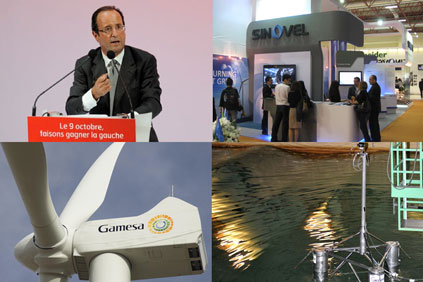Unsurprisingly, the biggest story of the week was Gamesa's decision to halt its R&D project to develop a 5MW offshore turbine in Chesapeake, Virginia. Instead it is shifting the project to its home market where it plans to install the turbine in the Canary Islands. The news also preceded the profit fall announced in its Q1 results.
Even though the US offshore market is hardly taking off at the moment, the move was something of a surprise. Gamesa has poured a lot of energy into developing the R&D centre as well as signing up marine contractor Northrup-Grumman as a partner. In March, it looked as though Chesapeake would host the first offshore wind turbine in US waters after it was approved by the US Army Corps of Engineers and the US Coast Guard.
Gamesa now has an offshore R&D centre in a country where it doesn't perceive there to be an offshore market. Watch this space…
From one company that is moving to its home market, to another that is looking away from it. Sinovel revealed earlier this week that it is opening an office in Turkey as part of its aim to expand beyond the highly competitive Chinese market. The decision to open an office in Turkey is hardly surprising following the recent award of a 600MW deal from the Turkish developer Agaoglu. What is interesting is Sinovel vice chairman Tao Gang's point that the company is looking to use it as a springboard into the Middle East. Look out Nordex, Gamesa et al.
Arguably, floating platforms represent the next stage of offshore wind turbine evolution. Acciona has announced it plans to install a 1.5MW turbine in Spanish waters next year. The project forms part of HiPRWind, an R&D programme with 60% (€11 million) EU funding. The project will be part-overseen by floating turbine pioneers from the Norwegian University of Science and Technology. It comes at an interesting time for Acciona, which has lost market share in recent years. However, it has a 3MW turbine coming to the market and is pushing into Latin America. In terms of offshore, considering the deep waters of its coast there is no question Spain needs a floating solution. The question is whether Spain needs offshore.
The election of a socialist president of France in François Hollande has been greeted with trepidation by some areas of the business community. However, the country's wind industry appeared to be pleased with the result. In the run-up to the election, Hollande has promised to simplify the wind farm regulations, which proliferated during his predecessor's term. Hollande has also said he wants to reduce the share of nuclear in the energy mix from around 75% to 50% by 2025 and a 30% reduction in greenhouse emissions by 2025.
A debate on energy has been promised for this autumn, leading to a new law early 2013 laying out how to finance the "energy transition". From there it will be seen if Hollande can live up to his pre-election promises.
Finally, the UK has approved a 100MW+ onshore project. Vattenfall has had permission to build a 250MW wind farm in Wales. When built, the Pen y Cymoedd project will be the largest onshore wind farm in England and Wales. As part of the development consent, Vattenfall will invest in a £3 million local habitat restoration project and a community fund of up to £55 million over the 25-year life of the project.
Follow on Twitter

.png)

.png)











